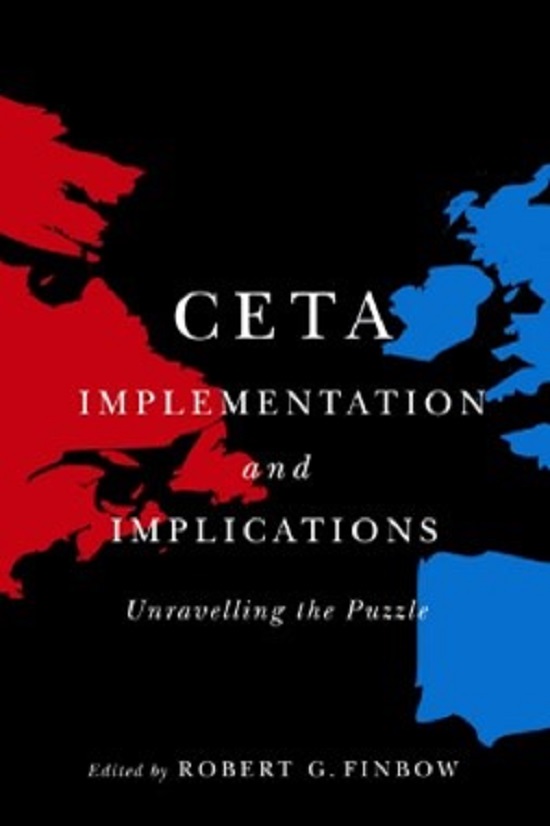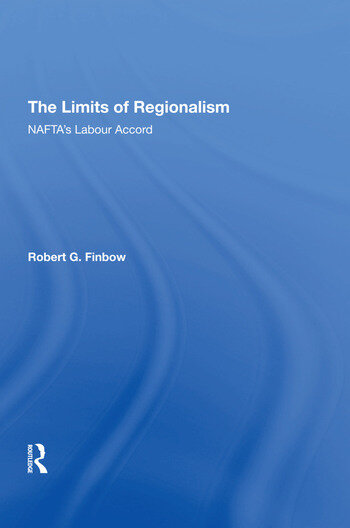Robert Finbow
Professor / Eric Dennis Memorial Professor of Political Science

Email: robert.finbow@dal.ca
Phone: (902) 494-6606
Mailing Address:
- Free trade agreements and social policy
- Canada-EU Economic and Trade Agreement (CETA)
- North American free trade and labour
- Regionalism in Canada
Education:
- Dalhousie University (B.A. Hon.)
- York University (M.A.)
- London School of Economics (MSc.)
- London School of Economics (Ph.D.)
Dr. Robert Finbow is Eric Dennis Memorial Chair of Government and Politics, Honours Coordinator and Deputy Director of the Jean Monnet European Union Centre of Excellence at Dalhousie University. As well as being a graduate of Dalhousie's honours programme, he holds an MA degree from York University and an MSc and PhD from the London School of Economics and Political Science.
Professor Finbow's current research focuses on the socially responsible elements of trade agreements, especially labour and social issues in NAFTA and the EU. His focus recently has been on the Canada-European Economic and Trade Agreement (CETA, especially the implications for social policy and federalism. He received an Erasmus+ grant from the European Commission for research on the CETA Implementation and Implications Project which analyzes the programmatic and legislative changes required to bring CETA to fruition in Canada and the EU and in Member States. The project covers a number of elements of CETA, including investment, intellectual property, agriculture, and the environmental and labour impacts. The CIPP conference on CETA Implementation occurred in late September 2019. Professor Finbow’s book on the project for McGill-Queen’s University Press will son be available. https://www.mqup.ca/ceta-implementation-and-implications-products-9780228011927.php?page_id=46&
Professor Finbow organized one of the Canadian government’s regional consultations for the socially responsible trade network and contributed a short piece to a volume summarizing the results. He was invited to a workshop to discuss the recommendations and the next steps and is engaged in ongoing collaborations with this network of scholars and stakeholders based at UQAM’s Centre d’etudes sur l’integration et la mondialisation (CEIM). He participated in a Colloquium on the instruments of a socially responsible trade policy in a context of commercial tensions in Montreal and presented on “NAALC’s Legacy: Improving Labour provisions in CUSMA and CETA?” He also took part in a meeting of the Jean Monnet centers in Ottawa at the EU Delegation, with EU Ambassador H.E. Peteris Ustubs, where a revived trans-Canadian network for the centers was discussed; and a meeting of project coordinators from across Canada which lead to the creation of a network of Erasmus + project alumni.
He has published books, chapters articles on the CETA and TTIP negotiations, the EU social dimension and fiscal crisis, labour and environmental aspects of NAFTA, comparative health care and social policy, comparative North American political cultures and Atlantic Canadian regionalism and comparative regional development in North America. He is currently working on theoretical piece on populism in contemporary democracy and a book proposal on the emergence of right populist political rhetoric in the “five eyes” states, examining similarities and variations in populist rhetoric and policy on trade and immigration.
Professor Finbow has served as acting Director of the Jean Monnet Centre, Department Chair, graduate coordinator and honours coordinator for the department of political science. He has received several SSHRC research grants as well as a Fulbright fellowship. He has participated in government consultations on NAFTA, CETA and the US-EU transatlantic partnership (TTIP). He served on the selection committee for Fulbright exchanges between Canada and the United States. He teaches on comparative politics and theory, American Politics, Latin America, and Canadian regionalism and political economy.
Research Interests:
Professor Finbow's current research focuses on labour and social issues and trade in North America and Europe; and implementation of the Canada-EU Economic and Trade Agreement (CETA). He also does research on comparative regional development in North America. His focus recently has been on the Canada-European Economic and Trade Agreement, especially the implications for social policy and federalism. He has also done research on Nova Scotia politics and parties over the past 25 years.

CETA Implementation and Implications: Unravelling the puzzle. Montreal: McGill-Queens University Press 2022).
https://www.mqup.ca/ceta-implementation-and-implications-products-9780228011927.php?page_id=46&

The Limits of Regionalism: NAFTA’s Labour Accord (London: Ashgate, 2006 – reprint Routledge 2017).
https://www.routledge.com/The-Limits-of-Regionalism-NAFTAs-Labour-Accord/Finbow/p/book/9780815397946
Selected Publications:
- Asymmetry and Civil Society Backlash: Changing European Calculations in Trans-Atlantic Investment Relations from CETA to TTIP and Beyond" Elaine Fahey (ed.) Research Handbook of Transatlantic Relations (Forthcoming: Routledge 2023), 337-351.
- Finbow, Robert (ed.) 2022 (published) CETA Implementation and Implications: Unravelling the puzzle. Montreal: McGill-Queens University Press 2022). Editor.
- Finbow, Robert 2021 “Constitutionalism by Stealth? CETA as an exemplar of Clarkson’s Supra national constitutionalism” in Marjorie Griffin Cohen, Michèle Rioux and Daniel Drache Eds Multiple Governance Dilemmas in the ‘new’ North America: A Tribute to Stephen Clarkson Chapter 5 (Palgrave).
- Finbow, Robert (2021) "The necessity of socially responsible trade” in M. Rioux, S. Zini and E. Belanger (eds.) Vers une politique commerciale socialement responsable dans un contexte de tensions commerciales Towards a Socially Responsible Trade Policy in an context of economic tensions, Center for Studies on Integration and Globalization (CEIM), University of Quebec at Montreal (UQÀM)
- Finbow, Robert (2020) “ Covid 19 Impacts on trade and the economy: Hard Choices for the EU” European Studies Association of Canada, Aug. 20, https://www.ecsa-c.ca/post/covid-19-impacts-on-trade-and-the-economy-hard-choices-for-the-eu
- Finbow, Robert (2019) “Implementing CETA: A preliminary report” Working paper, Jean Monnet Network on EU-Canada Relations Carleton University Ottawa https://carleton.ca/canadaeurope/wp-content/uploads/Robert-Finbow-Implementing-CETA-A-Preliminary-Report-Policy-Brief-August-2019.pdf.
- Finbow, Robert (2018a) “Can Trans-Atlantic trade relations be Institutionalized after Trump? Examining the Political and Global Governance context” in Elaine Fahey (ed.) Institutionalisation Beyond the Nation State: Transatlantic Relations, Data Privacy and Trade Law Springer, 187-211.
- Finbow, Robert (2018) “The Canada European Union Comprehensive Economic and Trade Agreement: securing a comprehensive deal in the populist era” Special Issue on “Inter-regionalism and the EU New Trade Strategy” Asia Pacific Journal of EU Studies 16 (1), 79-109.
- Finbow, Robert (2016) Restructuring the state through economic and trade agreements: the case of investment disputes resolution” Politics and Governance Special Issue "Supranational Institutions and Governance in an Era of Uncertain Norms" Cogitatio Press 4 (3), 2016, 62-76.
- Finbow, Robert (2013) “The Eurozone crisis and the social dimension: prospects for democratic practice in a reconstituted fiscal union” in Finn Laursen (ed). The EU and the Eurozone Crisis: Policy Challenges and Strategic Choices, (Ashgate, 2013) 45-64.
- Finbow, Robert (2013a) “Why has it taken so long to finalize CETA? Economic fragmentation in decentralized systems”. European Union Centres of Excellence Newsletter, Ottawa October 2013, 1, 6.
- Finbow, Robert (2013b) “CETA and Multi-level Governance: Implications for Provincial and Municipal Governments” Canada- Europe Transatlantic Dialogue, CETA Policy Briefs Series Ottawa, October 2013.
- Finbow, Robert (2012a) “Embedding liberalization: Will CETA undermine the social dimension of trans-Atlantic integration?” in Finn Laursen (ed.), The EU and the Political Economy of Transatlantic Relations Brussels: I.E. Peter Lang (Chapter 6), 123-146.
- Finbow, Robert (2010) “The Evolving Labour Relations Dimension of the European Regional System: a Model for North America?” in Finn Laursen (ed.) Comparative Regional Integration: Europe and Beyond Ashgate, 101-130.
- Finbow, Robert (2006) The Limits of Regionalism: NAFTA’s Labour Accord (London: Ashgate, 2006). Ashgate 2010, 101-130.
- Populist Backlash and Trade Agreements in North America: The Prospects for Progressive Trade Politics and Governance” (2023), 11(1), https://doi.org/10.17645/pag.v11i1.6078
Professor Finbow has published articles on labour and environmental aspects of NAFTA, comparative health care and social policy, comparative North American political cultures and Atlantic Canadian regionalism.
Service and Activity:
Professor Finbow has served previously as Chair, graduate coordinator and honours coordinator for the department. He has received several SSHRC research grants as well as a Fulbright fellowship. He has served on the selection committee for Fulbright exchanges between Canada and the United States. He teaches on comparative politics and theory, US politics, Latin America, and Canadian regionalism and political economy.
